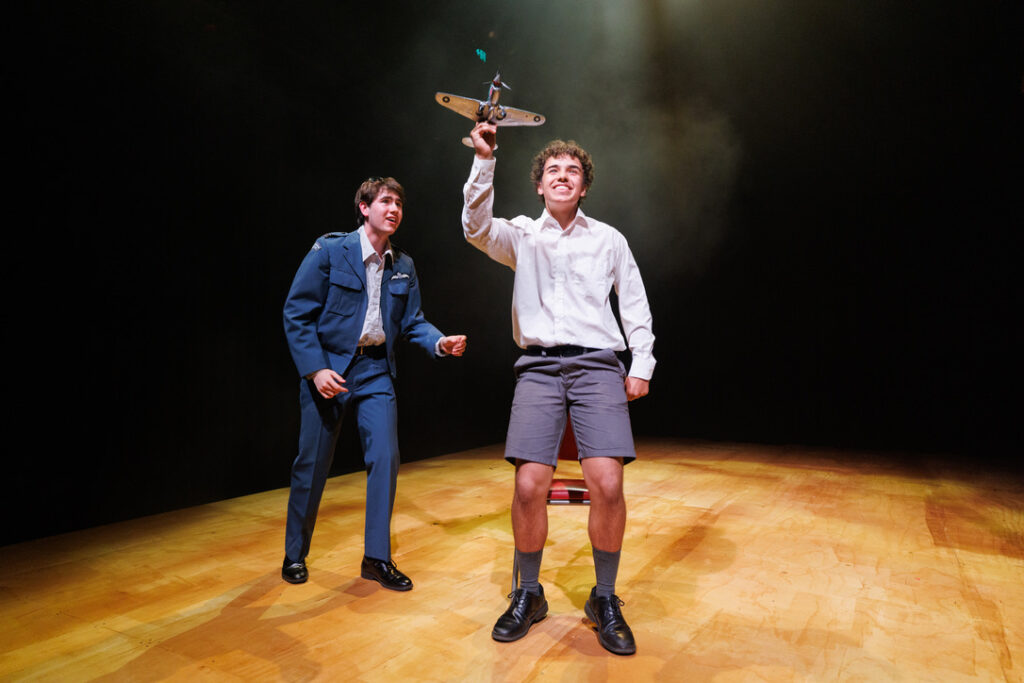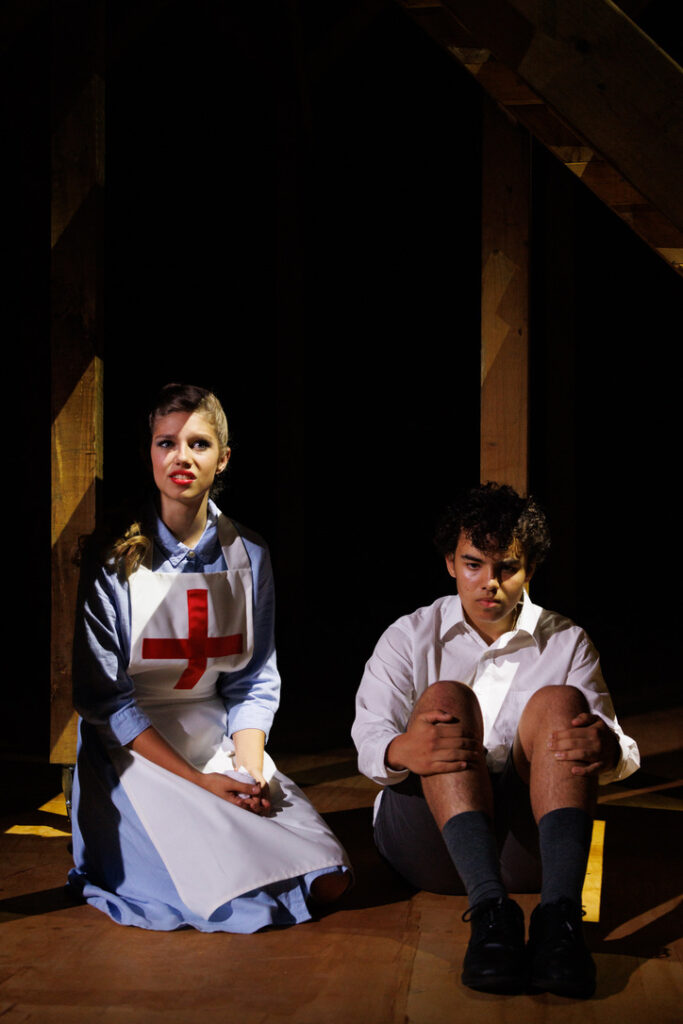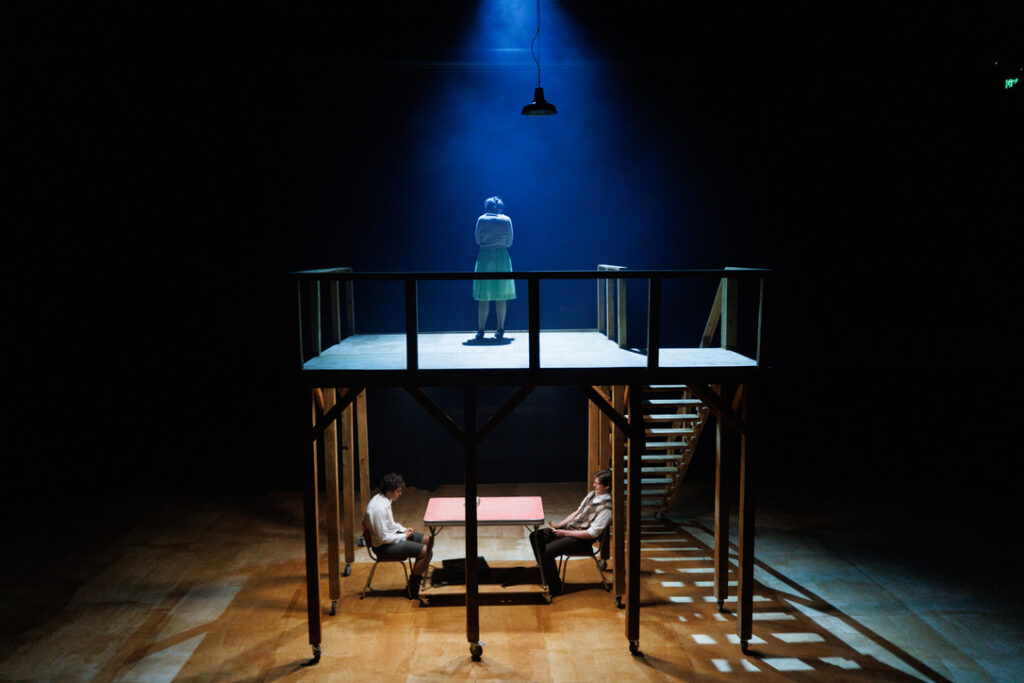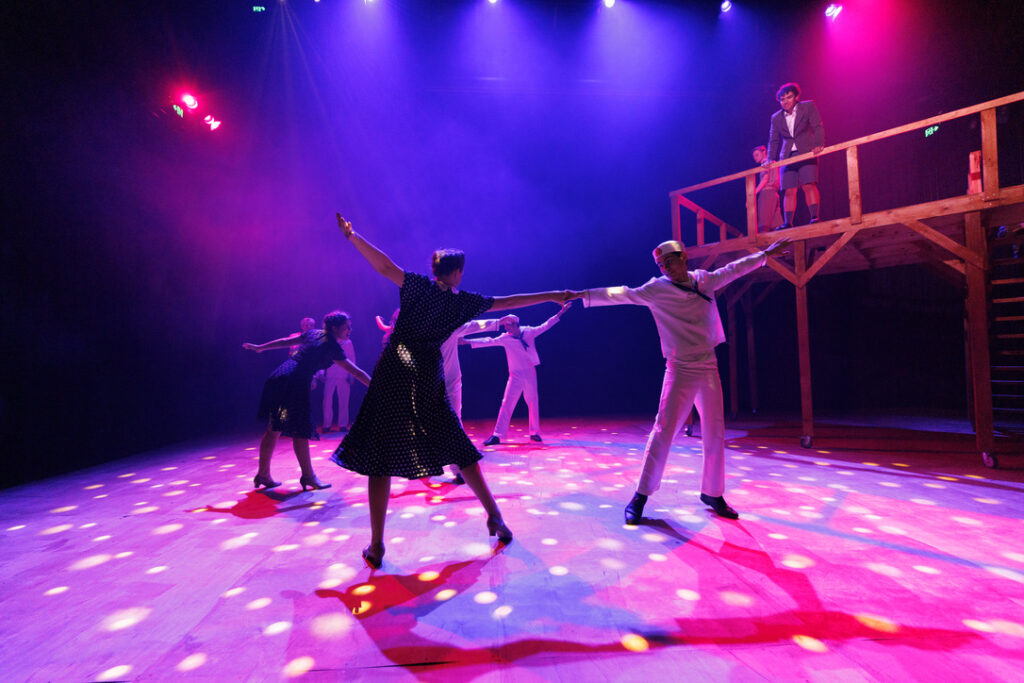By Michael Korompay
Walking into the drama theatre, with the warm lighting and jazz music, an immersive world was created, drawing the audience into the world of ‘Danny Fisher.’ Adapting Matthew Ryan’s play, Ms James’ captures the feeling of Australia in the 1940s, presenting a realistic and lived-in depiction of Brisbane during the second World War. Through the elaborate lighting, the dynamic set, and the atmospheric effects, the world is developed feels authentic and allows for an amazing viewing experience.
The play follows Danny Fisher (Jake Tollamache), a young Brisbane boy in the 1940s, who is obsessed with the idea of war as it nears Brisbane, and in particular, the Air Force, following in the footsteps of his older brother, Frank (Remy van Stom). Through the boyish enthusiasm throughout, Tollamache depicts a believable growing teen, experiencing the same wonder of planes and war that many felt in Australia in the 1940s, allowing his presence each scene to make the audience relate with his growth from his naïve innocence. His boyishness allows his relationships to feel authentic and true, including both with Frank, and his father.

(Above – Jake Tollamache and Remy Van Stom as Andy West, a former pilot that Danny meets)
Moreover, the constant focus upon him, rather than becoming stale, shows his growth of maturity throughout the play, and allows the audience to be immersed in his changing relationships throughout. This is shown in particular through his strong relationship with Patty (Emma Siegloff [SCEGGS]), as their pairing throughout the play allows for their believable friend dynamic, with their contrasting confidences. With Siegloff and Tollamache’s strong chemistry throughout, Patty acts as the complement to Danny, allowing their connection to seem truly authentic.

(Above – Jake Tollamache and Emma Siegloff standing against the cricket boys, [L-R] Sam Hopwood, Hugh Smith, Darcy Yu)
Both his relationship with Siegloff and with Sienna Marriott’s [MLC] Rose show Danny’s change throughout the play, and allowing the audience to see his change from his naivety to his maturity. Rose also acts as a role model and older sister to Danny, once again allowing the audience to see his strong relationships and the actor’s chemistry throughout.

(Above – Jake Tollamache with Sienna Marriot as Rose, with Rose acting as a role model for Danny)
Throughout the play, each character is portrayed authentically, with each seeming believable, even to smaller characters such as Danny’s Bullies, Hugh Smith, Sam Hopwood and Darcy Yu. However, along with Tollamache, several actors in particular shone out, including Angus Fletcher’s John Fisher, with his constant and convincing emotional scenes, allowing for rich chemistry with Danny. Fletcher’s energy is varied throughout, allowing him to transition from his viscerally emotional scenes to deep scenes with the other characters. This change of energy shows Fletcher’s range and allows him to stand out as one of the most interesting characters. Additionally the contrasting though similar characters of Douglas Macarthur (Isaac Holmes) and John Monash (Will Richardson) allows for each tableau moment with them together to be an interesting and funny interaction. Additionally, their different demeanours allows for a reflection of the animosity between Australian and American soldiers as Japan invaded Australia towards the end of WWII.
Throughout the play, lighting is used to great extent, allowing characters to seemingly be guided throughout the story, and suggesting that they, like the audience, are being guided on a journey. The shifts in the sources of lighting also allows spaces to seem new and fresh, as with light occupying a different space, the characters’ experiences inhibit that space as well. This is skillfully integrated with the set, as the use of lighting under the set allows even cramped spaces to feel rich and deep, such as in the creation of the kitchen. This is helped with the constant movement of the props throughout, with even chairs and tables moving throughout the space to prevent it from being stale, allowing for a flowing experience.

(Above – Jake Tollamache and Angus Fletcher on the lower level of the set, with Amelia Norton [MLC] above as Annie Fisher)
Moreover, the set itself also dynamically moves, meaning each scene is able to flow on from one to the next seamlessly, allowing Danny to remain the focus and showing how he struggles with the changes that rapidly happen to him throughout the play. The fluid set also allows for the transitions between scenes to remain extremely fluid and allows the energy to be retained throughout.
Moreover, the elevated nature of the set allows for more interesting levels and dynamics throughout the play, which allows scenes to play out with characters experiencing it from different places.

(Above – Jake Tollamache on the Upper Level of the set, with other actors dancing on the stage)
The elevation also allows for transitions to take place in the dark while scenes continue, thus preventing the need for excessive transition scenes. Additionally, the cover that the upper level of the set provides a shade to allow the effective entrance of exit of characters throughout, which is essential to retain the illusion of the seamless transitions.
Environmental and auditory effects are also commonly used throughout, often through a smoky and dusty haze to allow the world of the play to seem rich and natural. Moreover, the environment is deepened through the use of auditory effects, starting as soon as you enter the theatre, with the quiet jazz playing, once again manifesting the 1940s environment.
However, the acting in earlier scenes started off as slightly less confident, as they seemingly took a little while to inhibit the space. However, the energy quickly rose and they quickly gained their confidence and enhanced their performances throughout, allowing the play to become much more intriguing as it continued.
Overall, Danny Fish was an enjoyable experience, with the acting, dynamic set and effects allowing the world to seem authentic. Through the rich relationships depicted throughout, the play allows for characters to stand out as they grow throughout. As such, I would highly recommend that everyone should watch Danny Fisher.
